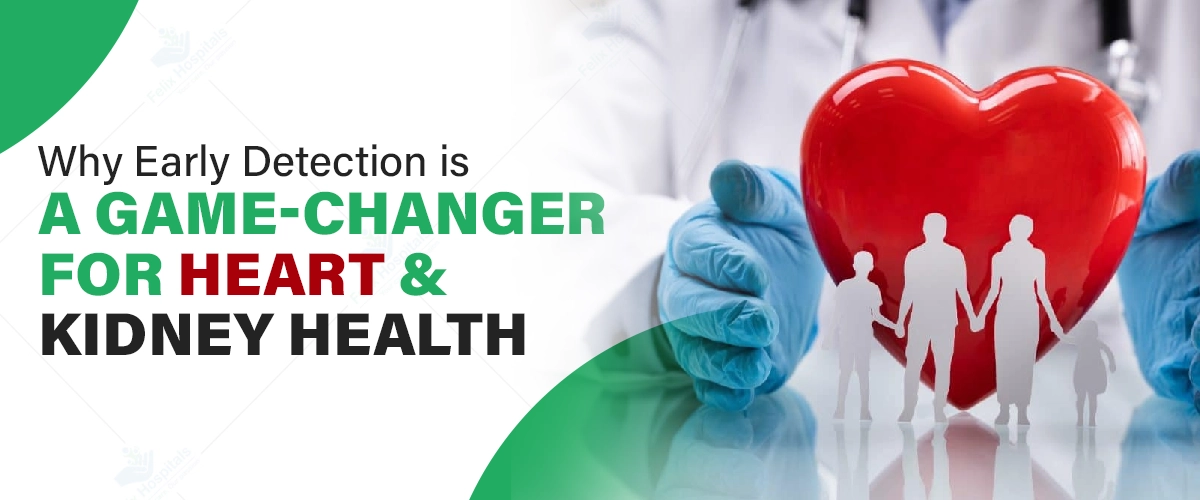
Subscribe to our

Have you ever wondered why heart and kidney health is interlinked? Why is it that when our heart health deteriorates, its impact is seen on our kidney health as well? Before we dive deeper into the connection that exists between these two vital organs, it’s important to understand that early detection plays a crucial role in prevention and management of conditions related to both heart and kidneys.
With timely intervention, complications can be minimized and the quality of life improved. Most importantly, regular check-ups and awareness of risk factors help to identify subtle warning signs before they escalate into severe health issues.
So, don’t wait until it’s too late. If you are hypertensive, diabetic or obese, schedule your heart and kidney health check-up today at Felix Hospitals and take the first step toward a healthier future.
Heart disease refers to conditions affecting the heart, such as coronary artery disease, arrhythmias, and heart failure. Kidney disease, on the other hand, involves the gradual loss of kidney function, often caused by diabetes, high blood pressure, or other chronic conditions.
The connection between the two is significant. Let’s understand how they work together. The heart’s job is to send a continuous supply of oxygenated blood around the body. The kidney’s prime function is to filter the blood, extract waste in the form of urine, and also control the blood pressure. When the heart fails to pump blood effectively, the kidneys receive reduced oxygen and nutrients, leading to impaired function. Conversely, damaged kidneys cannot regulate blood pressure properly, putting additional strain on the heart. This interdependence underscores the need for early detection and comprehensive care, especially in individuals already diagnosed or at risk of developing hypertension, diabetes and obesity.
Several factors contribute to the risk of developing heart and kidney diseases, including:
Early symptoms of both the diseases are often subtle but should not be ignored. In fact, most people don't experience any symptoms of chronic kidney disease or heart disease until it's at an advanced stage. Therefore, regular testing for everyone is important, but it is especially important for people at risk.
Timely diagnosis is critical for prevention as well as management of heart and kidney diseases effectively. Regular screenings, especially for individuals at higher risk, can identify issues in their earliest stages, allowing for prompt treatment. Key diagnostic tests include:
Treatment for heart and kidney diseases typically involves a combination of lifestyle changes, medications, and sometimes surgical interventions.
Adopting a balanced diet rich in fruits, vegetables and whole grains. However, if you've been diagnosed with CKD or kidney diseases, you may have to cut down on protein intake.
Limiting salt and sugar intake. Excess sugar intake can cause diabetes and excess salt intake can elevate blood pressure. Both the conditions can impact your kidneys.
Engaging in regular physical activity. Sedentary lifestyle is correlated to CVDs and decreased kidney function.
Avoiding smoking and excessive alcohol consumption.
Depending on your diagnosis, your doctor may prescribe you blood pressure medications, statins to manage cholesterol levels, medications to control blood sugar in diabetic patients or diuretics to manage fluid retention.
Depending on your diagnosis, common heart surgeries such as coronary artery bypass grafting (CABG) or angioplasty, among others may be required. Heart attack surgery will be necessary if you experience a heart attack.
Dialysis and kidney transplant surgery are treatments in advanced kidney disease cases. There are two types of dialysis: hemodialysis and peritoneal dialysis. As the kidneys lose their ability to function, fluid, waste products, and electrolytes begin to build up in the blood. A kidney transplant should be performed or dialysis should begin before kidney disease has advanced to the point where life-threatening complications occur.
To protect your heart and kidneys from getting damaged, prevention is always better than cure. To reduce your risk of developing heart and kidney diseases:
Felix Hospitals, Noida provides comprehensive care for heart and kidney health. Our team of experienced cardiologists led by Dr. Virendra Singh, and Dr Rahul Arora and nephrologists led by Dr Sameer Tawakley utilizes cutting-edge technology to ensure accurate diagnoses and effective treatments. With a patient-centric approach, we aim to empower you with the knowledge and tools needed to take control of your health.
Our holistic care programs include regular screenings, lifestyle counseling, and personalized treatment plans to help you achieve optimal health.
Schedule an appointment with the experts at Felix Hospitals and benefit from world-class heart and kidney care.
Early detection, identifying risks and addressing them promptly can prevent serious complications of heart and kidneys, thereby improving your quality of life. By understanding the causes, symptoms, and available treatments, individuals can take proactive steps to protect these vital organs.
At Felix Hospitals, we are committed to guiding you on your healthcare journey. With the right care and timely interventions, a healthier life is within reach. To book an appointment, contact us at + (91) 9667064100.
Q- Why are heart and kidney diseases often linked?
Ans- The heart and kidneys are interconnected; when one is damaged, it often affects the other due to shared blood circulation and regulatory functions.
Q- How often should I get screened for heart and kidney health?
Ans- Individuals with risk factors like diabetes, high blood pressure, or a family history should undergo annual check-ups. It’s important to consult your doctor for personalized recommendations.
Q- Can I reduce my risk of getting diseases of the heart and kidneys?
Ans- Absolutely! Adopt a healthy diet, exercise regularly, avoid smoking and excessive alcohol, and manage chronic conditions like diabetes or hypertension.
Q- Are heart and kidney diseases reversible?
Ans- While damage cannot always be reversed, early detection and treatment can slow progression and significantly improve quality of life.
Q- Can a kidney infection affect your heart?
Ans- If you have kidney disease, you are more likely to get heart disease. Heart disease is the most common cause of death among people who have kidney disease.